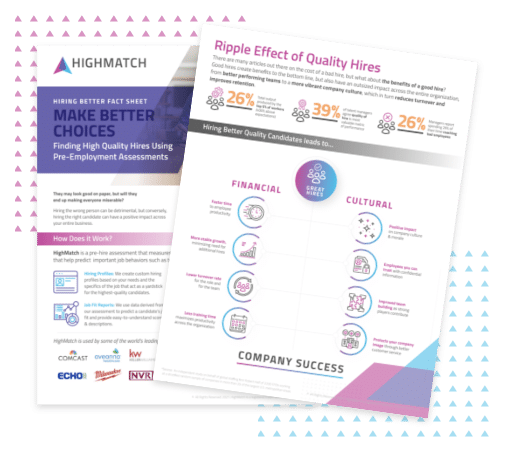HighMatch Guides
What is a Situational judgement test?
Situational judgement tests (SJTs) are used to evaluate an individual’s decision-making skills in various work-related scenarios. These tests are often included as part of a larger pre-employment assessment to assess how likely an individual is to succeed in an organization.
The following guide will explore how situational judgement tests work, their benefits, and their common use cases.
How Situational Judgement Tests Work
Situational Judgement tests typically work by providing a series of scenarios to a job candidate. The candidate then chooses the most appropriate course of action from a list of options. The scenarios typically reflect situations the candidate might face after being hired.
The results from the test provide a measure for an individual’s judgement, problem solving abilities, decision-making skills, and ability to handle challenges in the workplace.
Situational Judgement tests are valuable for screening but do not provide a comprehensive view of an individual. Situational Judgement tests should not be used as the sole basis for making decisions about an individual.
Benefits of Situational Judgement Testing
- Predictive validity: situational judgement tests, on average, are very effective in predicting future job performance
- Efficient screening: situational judgement tests provide a fast and effective way to find the most suitable candidates for the next stage of the hiring process
- Better hiring decisions: information on an individual’s problem solving abilities and decision making skills provides a valuable basis for hiring decisions
- Better culture fit: situational judgement tests can gauge how well candidates align with company values which helps determine if they’ll fit the organization’s culture
Use Cases for Situational Judgement Testing
- Recruitment and selection: SJTs help identify candidates with the desired behaviors and decision-making abilities for the role.
- Improve hiring efficiency: For high volume jobs with many applicants, test results can be used early in the process to filter out poor-fit candidates, freeing up recruiters to focus on candidates with the highest potential.
- Avoid costly hiring mistakes: Hiring the wrong employee can result in a significant amount of training, replacement, and error correction costs. Using pre SJTs reduces the number of hiring mistakes which saves your organization money.
- Raise red flags early: Candidates often present the best version of themselves, making it difficult to assess risk factors. Situational judgement tests may identify critical gaps in a candidate’s decision-making abilities.
Summary
Situational Judgement tests evaluate how likely an individual is to succeed based on their responses to hypothetical on-the-job scenarios. These assessments can help inform hiring decisions, raise red flags early, and improve screening efficiency. In order to get a comprehensive view of the individual, situational judgement tests should be used alongside other tools or assessments.


